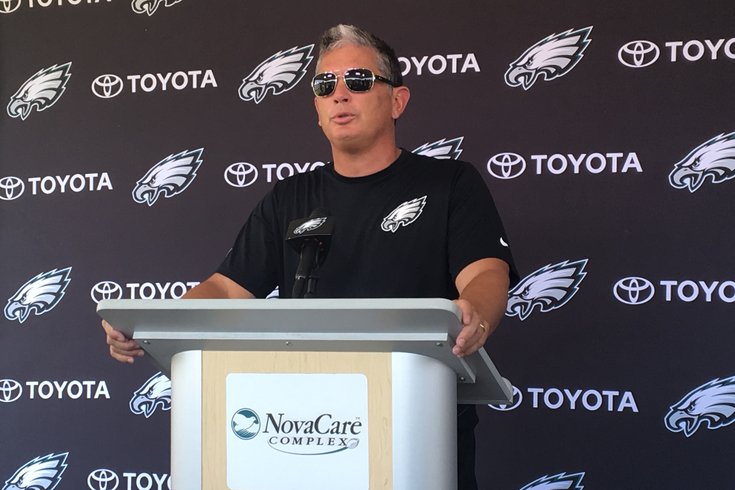
July 26, 2016
 Matt Mullin/PhillyVoice
Matt Mullin/PhillyVoice
Eagles defensive coordinator Jim Schwartz, looking as cool as the other side of the pillow.
For the second straight day, it was oppressively hot out on the practice fields at the NovaCare Complex. But Philadelphia Eagles defensive coordinator Jim Schwartz did seem bothered one bit.
When he stepped to the podium following the second day of training camp -- it's still just rookies and select veterans, including the QBs -- Schwartz looked much cooler than the crowd of media crammed into the tiny interview tent, hoping for for a piece of the shade.
More about Schwartz's defensive philosophy -- and how it translates to this specific team and roster of players -- will be revealed as camp goes on, especially once the rest of the team arrives on Thursday. But given that this was his first training camp with the Eagles and his first time speaking to the media in the last six weeks, it's as good a time as any for a refresher on how the 50-year-old former head coach wants his unit to play.
Luckily, Schwartz was kind enough to outline his plan on Tuesday. And it looks a little something like this...
"We're not rocket scientists. We're not trying to reinvent anything."
"We want to put guys in good positions, communicate well, play what fits them -- all those things are important to us. We're not trying to set a record for being difficult."
Well, that's certainly a departure from life under the Chip Kelly regime. During those three years, it seemed like the defense was an afterthought. The pace at which the offense played caused Billy Davis' defense to break down as games and seasons went on. That was in large part due to the fact that Kelly was trying to reinvent the NFL.
This year, it seems like the Eagles braintrust is going to try to keep it simple. And, given the defensive personnel, we may actually see a team that's built around the defense, not the other way around.
“We want to be an attack defense. We want to put pressure on the quarterback. We want to — like anything, it’s very difficult to defend the entire field. So what we want to try to do is defend the things that are easiest for the offense to capitalize on, and try to make them do what is most difficult."
We already know that Schwartz is bringing the wide-9 back to Philly. And while that word may cause you to have a panic attack as you envision Jim Washburn and Jason Babin laughing in your face, here's something to try to calm those nerves: this is the kind of system Fletcher Cox was built (and drafted) to play in. After a career year in 2015-16, he may be even better this year.
Another reason for that will be the attacking style Schwartz mentioned above. Under Davis, the team played a two-gap system, meaning the defensive linemen waited to see which way the play was going before deciding which of their two gaps to fill. In Schwartz's system, those linemen and, in some cases, linebackers, will be unleashed on the opposing offense with what he likes to refer to as "fastballs."
You can do one of two things: act or react. After three years of doing the latter, it appears Schwartz is ready to act.
“Also, we’ve got to be multi-dimensional enough that we can change from week to week. There might be some weeks when we play a lot of eight-man front if we have a good running team. There might be some weeks we play very little eight-man front. We have to have smart enough and multi-dimensional enough players that we can morph from week to week, for lack of a better term.”
In specific terms, Schwartz doesn't really know what his defense will be. He's going to change formations and personnel based on what his opponent's strength's are. Put it this way: You wouldn't play the same way against Aaron Rodgers and the Packers as you would against Tyrod Taylor and the Bills, right? It just makes sense.
In the modern NFL, you need to be able to do this well if you want to win football games. There are very few defenses that can impose their will no matter the opponent. And as of now, the Eagles, who found out the hard way last season that playing the same defense week after week can be a recipe for disaster, are definitely not one of those teams.
This also stays in line with his mission statement. He seemingly wants to build his system around the players he has rather than -- and pardon the terrible cliche -- trying to fit a square peg into a round hole.
"In a nutshell, we want to allow less points than our offense scores. Look — rankings, stats — the only thing that matters in this league is wins and losses. And I’ll take a 42-41 game — I might not sleep well afterwards, but I’ll take it. I’d rather have that than a 7-3 game that you lose."
For a second, it seemed like Schwartz was going to drop an Al Davis "Just win, baby" on us. He didn't, but the message here is essentially the same. Schwartz has been around the league long enough to know that having a great defense is meaningless if the offense can't score. Take a look at the Rams last season, who finished just 15 points behind the New England Patriots in terms of points allowed. But the Patriots ranked third in the NFL in points scored while the Rams ranked 29th.
Want to guess which team was 7-9 and which one finished 12-4 (not to mention two points shy of reaching the Super Bowl?
I know that was an easy question. This isn't rocket science.
Follow Matt on Twitter: @matt_mullin